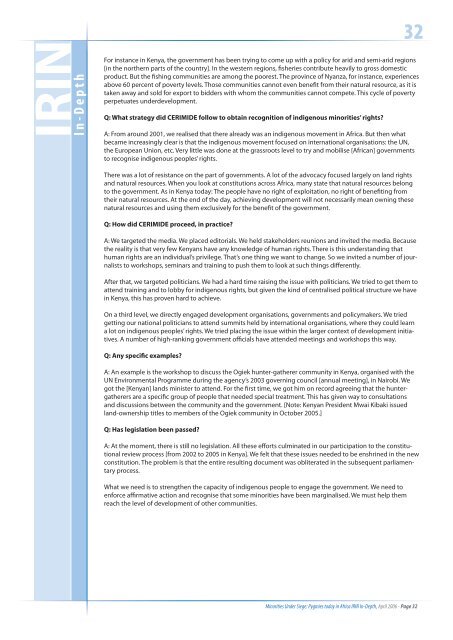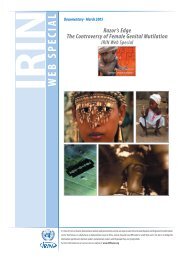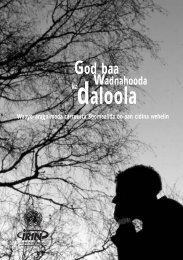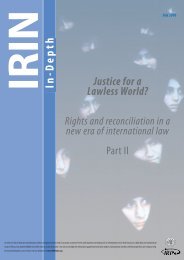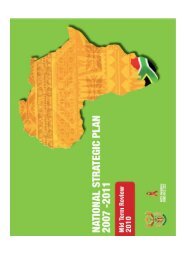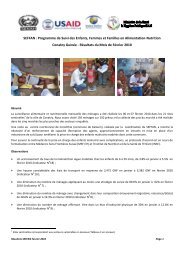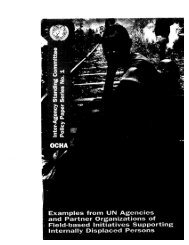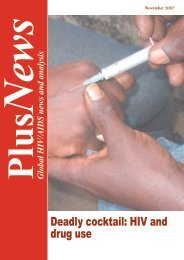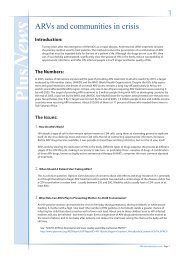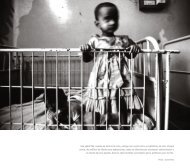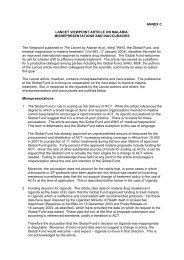Minorities Under Siege: Pygmies today in Africa - IRIN
Minorities Under Siege: Pygmies today in Africa - IRIN
Minorities Under Siege: Pygmies today in Africa - IRIN
You also want an ePaper? Increase the reach of your titles
YUMPU automatically turns print PDFs into web optimized ePapers that Google loves.
<strong>IRIN</strong><br />
I n - D e p t h<br />
32<br />
For <strong>in</strong>stance <strong>in</strong> Kenya, the government has been try<strong>in</strong>g to come up with a policy for arid and semi-arid regions<br />
[<strong>in</strong> the northern parts of the country]. In the western regions, fisheries contribute heavily to gross domestic<br />
product. But the fish<strong>in</strong>g communities are among the poorest. The prov<strong>in</strong>ce of Nyanza, for <strong>in</strong>stance, experiences<br />
above 60 percent of poverty levels. Those communities cannot even benefit from their natural resource, as it is<br />
taken away and sold for export to bidders with whom the communities cannot compete. This cycle of poverty<br />
perpetuates underdevelopment.<br />
Q: What strategy did CERIMIDE follow to obta<strong>in</strong> recognition of <strong>in</strong>digenous m<strong>in</strong>orities’ rights?<br />
A: From around 2001, we realised that there already was an <strong>in</strong>digenous movement <strong>in</strong> <strong>Africa</strong>. But then what<br />
became <strong>in</strong>creas<strong>in</strong>gly clear is that the <strong>in</strong>digenous movement focused on <strong>in</strong>ternational organisations: the UN,<br />
the European Union, etc. Very little was done at the grassroots level to try and mobilise [<strong>Africa</strong>n] governments<br />
to recognise <strong>in</strong>digenous peoples’ rights.<br />
There was a lot of resistance on the part of governments. A lot of the advocacy focused largely on land rights<br />
and natural resources. When you look at constitutions across <strong>Africa</strong>, many state that natural resources belong<br />
to the government. As <strong>in</strong> Kenya <strong>today</strong>: The people have no right of exploitation, no right of benefit<strong>in</strong>g from<br />
their natural resources. At the end of the day, achiev<strong>in</strong>g development will not necessarily mean own<strong>in</strong>g these<br />
natural resources and us<strong>in</strong>g them exclusively for the benefit of the government.<br />
Q: How did CERIMIDE proceed, <strong>in</strong> practice?<br />
A: We targeted the media. We placed editorials. We held stakeholders reunions and <strong>in</strong>vited the media. Because<br />
the reality is that very few Kenyans have any knowledge of human rights. There is this understand<strong>in</strong>g that<br />
human rights are an <strong>in</strong>dividual’s privilege. That’s one th<strong>in</strong>g we want to change. So we <strong>in</strong>vited a number of journalists<br />
to workshops, sem<strong>in</strong>ars and tra<strong>in</strong><strong>in</strong>g to push them to look at such th<strong>in</strong>gs differently.<br />
After that, we targeted politicians. We had a hard time rais<strong>in</strong>g the issue with politicians. We tried to get them to<br />
attend tra<strong>in</strong><strong>in</strong>g and to lobby for <strong>in</strong>digenous rights, but given the k<strong>in</strong>d of centralised political structure we have<br />
<strong>in</strong> Kenya, this has proven hard to achieve.<br />
On a third level, we directly engaged development organisations, governments and policymakers. We tried<br />
gett<strong>in</strong>g our national politicians to attend summits held by <strong>in</strong>ternational organisations, where they could learn<br />
a lot on <strong>in</strong>digenous peoples’ rights. We tried plac<strong>in</strong>g the issue with<strong>in</strong> the larger context of development <strong>in</strong>itiatives.<br />
A number of high-rank<strong>in</strong>g government officials have attended meet<strong>in</strong>gs and workshops this way.<br />
Q: Any specific examples?<br />
A: An example is the workshop to discuss the Ogiek hunter-gatherer community <strong>in</strong> Kenya, organised with the<br />
UN Environmental Programme dur<strong>in</strong>g the agency’s 2003 govern<strong>in</strong>g council [annual meet<strong>in</strong>g], <strong>in</strong> Nairobi. We<br />
got the [Kenyan] lands m<strong>in</strong>ister to attend. For the first time, we got him on record agree<strong>in</strong>g that the huntergatherers<br />
are a specific group of people that needed special treatment. This has given way to consultations<br />
and discussions between the community and the government. [Note: Kenyan President Mwai Kibaki issued<br />
land-ownership titles to members of the Ogiek community <strong>in</strong> October 2005.]<br />
Q: Has legislation been passed?<br />
A: At the moment, there is still no legislation. All these efforts culm<strong>in</strong>ated <strong>in</strong> our participation to the constitutional<br />
review process [from 2002 to 2005 <strong>in</strong> Kenya]. We felt that these issues needed to be enshr<strong>in</strong>ed <strong>in</strong> the new<br />
constitution. The problem is that the entire result<strong>in</strong>g document was obliterated <strong>in</strong> the subsequent parliamentary<br />
process.<br />
What we need is to strengthen the capacity of <strong>in</strong>digenous people to engage the government. We need to<br />
enforce affirmative action and recognise that some m<strong>in</strong>orities have been marg<strong>in</strong>alised. We must help them<br />
reach the level of development of other communities.<br />
<strong>M<strong>in</strong>orities</strong> <strong>Under</strong> <strong>Siege</strong>: <strong>Pygmies</strong> <strong>today</strong> <strong>in</strong> <strong>Africa</strong> <strong>IRIN</strong> In-Depth, April 2006 - Page 32


